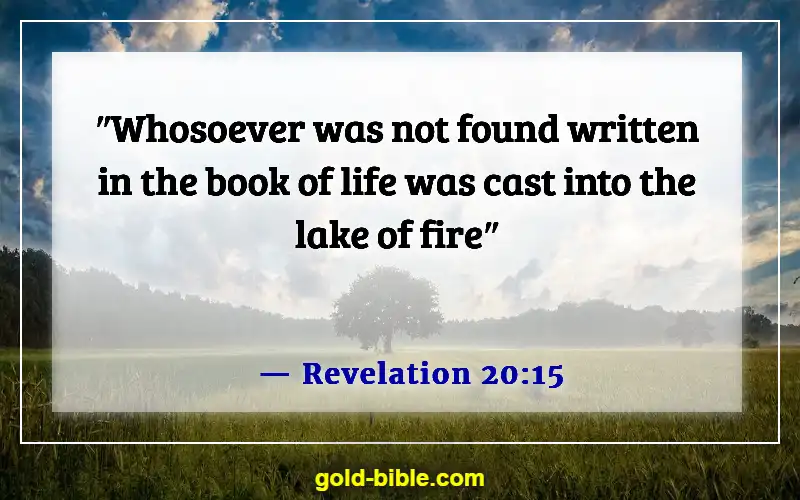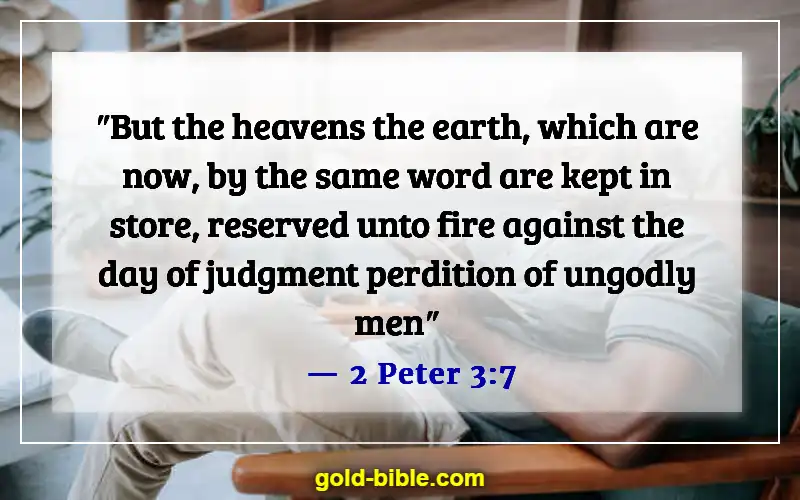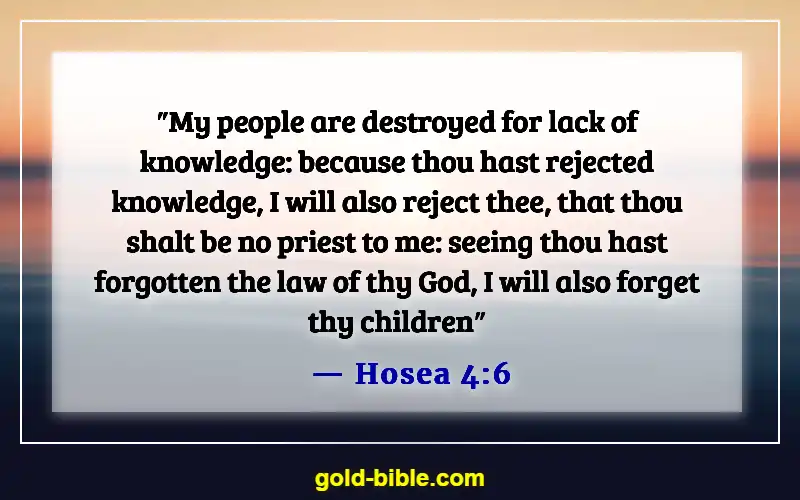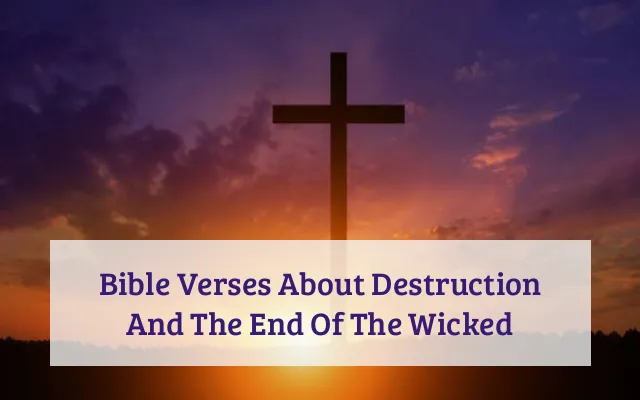Friends, if you’re searching for “Bible Verses About Destruction And The End Of The Wicked,” this content is for you. Today, I’m sharing Bible verses that will help you better understand what the Bible says about the fate of the wicked and the concept of destruction. These scriptures offer insights into God’s judgment and the consequences of unrighteousness. Let’s explore what the Word reveals about the ultimate end of those who reject God’s ways and persist in wickedness.
Contents
Introductions
Dear brothers and sisters,
I hope this message finds you well. Today, we’ll delve into an important and thought-provoking topic: the fate of the wicked as depicted in the Bible. This subject, while serious, offers us profound insights into God’s justice and His call for us to lead righteous lives. If you find this content enlightening, please consider sharing it with others who might benefit from these teachings.
The Bible clearly outlines the destiny of those who choose to walk away from God’s path. It describes a future of ruin and separation from God for the wicked. This is not intended to instill fear, but rather to guide us towards a life of righteousness, encouraging us to align our lives with God’s will.
In the Old Testament, we encounter numerous prophecies about the downfall of nations and individuals who strayed from God. These warnings are powerful reminders of God’s sovereignty and His intolerance for sin. The prophets addressed not only Israel but also the surrounding nations, demonstrating that God’s judgment is universal.
In the New Testament, Jesus and His apostles spoke extensively about judgment and the end times. They highlighted the importance of repentance and faith in Christ as the path to salvation. These teachings urge us to live in a state of readiness, always prepared for the return of our Lord.
When we read about destruction in these texts, it’s crucial to interpret them accurately. Often, they employ symbolic language to convey profound spiritual truths. We must approach these scriptures with wisdom and discernment, seeking to understand their deeper meanings and implications for our lives today.
Even amidst the warnings of judgment, the Bible offers tremendous hope. God’s desire is for everyone to come to repentance and experience salvation. His mercy is evident throughout scripture, balancing His justice with His love for humanity. For those who turn to Him, there is always the promise of forgiveness and restoration.
As believers, we can take comfort in knowing that God’s ultimate plan is one of redemption. While the wicked may face destruction, those who put their faith in Christ have the assurance of eternal life. This hope should motivate us to live righteously and to share the good news of salvation with others.
Let these teachings resonate in our hearts, shaping our lives and drawing us closer to God. May we be found faithful when Christ returns, having lived lives that honor Him and reflect His love to those around us.
Dear friends, let us now reflect on the Biblical insights about the end of the wicked and the promise of salvation for the faithful. May these truths inspire us to live with purpose and hope.
What Does the Bible Say About the Fate of the Wicked?
The Bible provides numerous insights into the fate of the wicked, painting a clear picture of the consequences of living a life contrary to God’s will. Throughout both the Old and New Testaments, there are warnings about the ultimate destruction that awaits those who choose the path of wickedness. These scriptures often highlight the stark contrast between the righteous and the wicked, emphasizing that while the righteous are rewarded with eternal life, the wicked face destruction and separation from God. This theme is consistent across the scriptures, serving as a cautionary message to those who ignore divine teachings. The Bible’s messages about the fate of the wicked are often used to encourage believers to stay on the righteous path, offering both a warning and a call for repentance. Through these verses, the Bible communicates the severe consequences of sin and the importance of aligning one’s life with God’s commandments to avoid the dire fate of the wicked.
“But the wicked shall perish, the enemies of the Lord shall be as the fat of lambs: they shall consume; into smoke shall they consume away”— Psalm 37:20

“The way of the Lord is strength to the upright: but destruction shall be to the workers of iniquity”— Proverbs 10:29

“Behold, the day of the Lord cometh, cruel both with wrath fierce anger, to lay the land desolate: he shall destroy the sinners thereof out of it”— Isaiah 13:9

“For, behold, the day cometh, that shall burn as an oven; all the proud, yea, all that do wickedly, shall be stubble: the day that cometh shall burn them up, saith the Lord of hosts, that it shall leave them neither root nor branch”— Malachi 4:1
Key Prophecies of Destruction in the Old Testament
The Old Testament is rich with prophecies concerning the destruction of nations and peoples who have turned away from God. These prophecies often serve as both a warning and a testament to God’s justice and sovereignty. The prophets, acting as God’s messengers, conveyed warnings of impending doom to those who persisted in their wicked ways. These warnings were not only directed at the Israelites but also at surrounding nations that were engaged in idolatry and moral corruption. Through these prophecies, the Old Testament underscores the idea that God does not tolerate sin indefinitely and that there is a divine reckoning for those who defy His laws. These verses also highlight the importance of repentance and the possibility of redemption if people turn back to God. The prophetic messages serve as a reminder that, despite the certainty of destruction for the wicked, there is hope for those who choose to change their ways.
“Destruction cometh; they shall seek peace, there shall be none”— Ezekiel 7:25
“A noise shall come even to the ends of the earth; for the Lord hath a controversy with the nations, he will plead with all flesh; he will give them that are wicked to the sword, saith the Lord”— Jeremiah 25:31
“For the indignation of the Lord is upon all nations, his fury upon all their armies: he hath utterly destroyed them, he hath delivered them to the slaughter”— Isaiah 34:2
“But with an overrunning flood he will make an utter end of the place thereof, darkness shall pursue his enemies”— Nahum 1:8
New Testament Teachings on Judgment and the End Times
The New Testament brings a renewed focus on the themes of judgment and the end times, particularly through the teachings of Jesus and the writings of the apostles. These scriptures often describe the final judgment, where the righteous will be separated from the wicked. The New Testament emphasizes the urgency of repentance and faith in Jesus Christ as the path to salvation, as opposed to the destruction that awaits those who reject Him. The teachings on the end times include vivid imagery and parables that illustrate the sudden and definitive nature of God’s judgment. These passages serve as a call to vigilance, encouraging believers to live in a state of readiness for the return of Christ. In this context, the New Testament reinforces the theme of divine justice and mercy, offering a hopeful message for those who choose to follow Christ while warning of the dire consequences for those who do not.

“These shall go away into everlasting punishment: but the righteous into life eternal”— Matthew 25:46

“Who shall be punished with everlasting destruction from the presence of the Lord, from the glory of his power”— 2 Thessalonians 1:9

“Whosoever was not found written in the book of life was cast into the lake of fire”— Revelation 20:15

“But the heavens the earth, which are now, by the same word are kept in store, reserved unto fire against the day of judgment perdition of ungodly men”— 2 Peter 3:7
How to Interpret Biblical Passages on Destruction
Interpreting biblical passages on destruction requires understanding the historical and literary context in which they were written. Many of these passages use symbolic language and vivid imagery to convey their messages, making it important to approach them with a careful and thoughtful mindset. Scholars often emphasize the need to consider the audience and purpose of the texts, as well as the overarching narrative of the Bible. Theologians suggest that these passages should not be read in isolation but rather in the context of the entire biblical canon, which reveals a narrative of redemption and hope alongside warnings of destruction. It’s also crucial to discern between literal and metaphorical interpretations, recognizing that some descriptions may be allegorical, designed to convey deeper spiritual truths. Studying these passages can provide insights into God’s character, His justice, and His desire for humanity to turn away from sin and towards righteousness.

“Shall cast them into a furnace of fire: there shall be wailing gnashing of teeth”— Matthew 13:42
“Therefore I will judge you, O house of Israel, every one according to his ways, saith the Lord God . Repent, turn yourselves from all your transgressions; so iniquity shall not be your ruinCast away from you all your transgressions, whereby ye have transgressed; make you a new heart a new spirit: for why will ye die, O house of Israel?For I have no pleasure in the death of him that dieth, saith the Lord God : wherefore turn yourselves, live ye”— Ezekiel 18:30-32

“My people are destroyed for lack of knowledge: because thou hast rejected knowledge, I will also reject thee, that thou shalt be no priest to me: seeing thou hast forgotten the law of thy God, I will also forget thy children”— Hosea 4:6
“That day is a day of wrath, a day of trouble distress, a day of wasteness desolation, a day of darkness gloominess, a day of clouds thick darkness”— Zephaniah 1:15
Finding Hope Amidst Prophecies of Destruction
Amidst the prophecies of destruction found in the Bible, there is a persistent thread of hope and redemption. The scriptures often balance warnings of judgment with promises of restoration for those who turn back to God. This duality reflects the nature of God’s justice and mercy, offering an opportunity for repentance and renewal. The Bible assures believers that, despite the impending destruction for the wicked, there is hope for those who seek God’s forgiveness and strive to live according to His commandments. Many passages emphasize God’s willingness to forgive and restore those who genuinely repent, highlighting His desire for all to come to salvation. This message of hope is vital for believers, providing encouragement and assurance that, despite the challenges and trials they may face, God’s promise of eternal life and peace remains steadfast for those who remain faithful.
“Therefore also now, saith the Lord , turn ye even to me with all your heart, with fasting, with weeping, with mourningAnd rend your heart, not your garments, turn unto the Lord your God: for he is gracious merciful, slow to anger, of great kindness, repenteth him of the evil”— Joel 2:12-13

“Let the wicked forsake his way, the unrighteous man his thoughts: let him return unto the Lord , he will have mercy upon him; to our God, for he will abundantly pardon”— Isaiah 55:7

“If we confess our sins, he is faithful just to forgive us our sins, to cleanse us from all unrighteousness”— 1 John 1:9

“Now the God of hope fill you with all joy peace in believing, that ye may abound in hope, through the power of the Holy Ghost”— Romans 15:13
Conclusions
In conclusion, the Bible’s teachings on destruction and the end of the wicked serve as a powerful reminder of God’s justice and the consequences of rejecting His love and guidance. While these passages may seem daunting, they ultimately highlight the importance of living a righteous life and seeking a relationship with God.
By studying these verses, we gain a deeper understanding of God’s character and His desire for humanity to choose righteousness. Rather than focusing solely on the destructive aspects, we should use this knowledge to inspire positive change in our lives and communities.
Applying these teachings to our daily lives involves self-reflection, repentance, and a commitment to following God’s commandments. We should strive to embody love, compassion, and forgiveness in our interactions with others, while also standing firm against wickedness and injustice.
Moreover, these prophecies and warnings should motivate us to share the Gospel and help others find salvation. By embracing God’s word and living according to His will, we can find hope, peace, and purpose in a world that often seems chaotic and uncertain. Ultimately, the Bible’s teachings on destruction and judgment should lead us to a deeper faith and a more meaningful relationship with our Creator.
